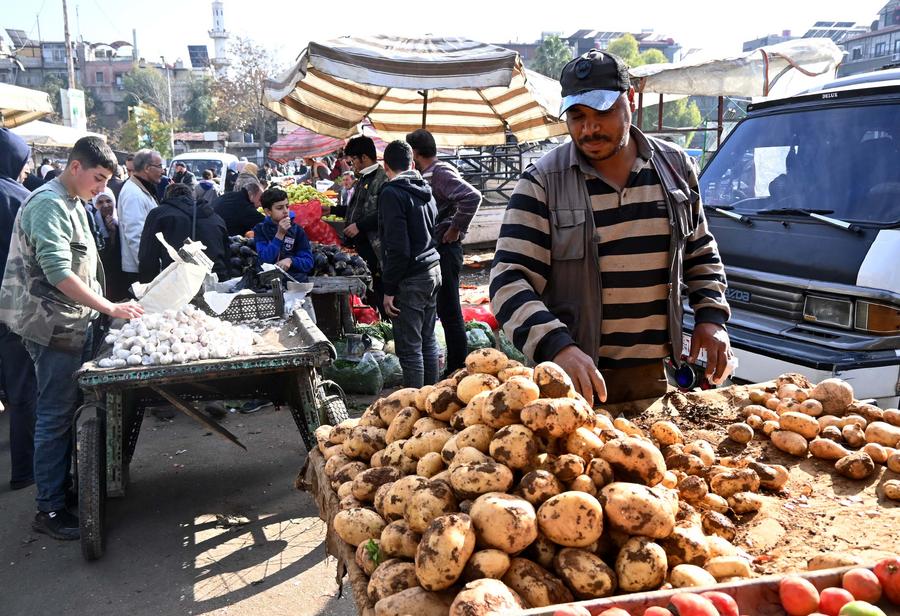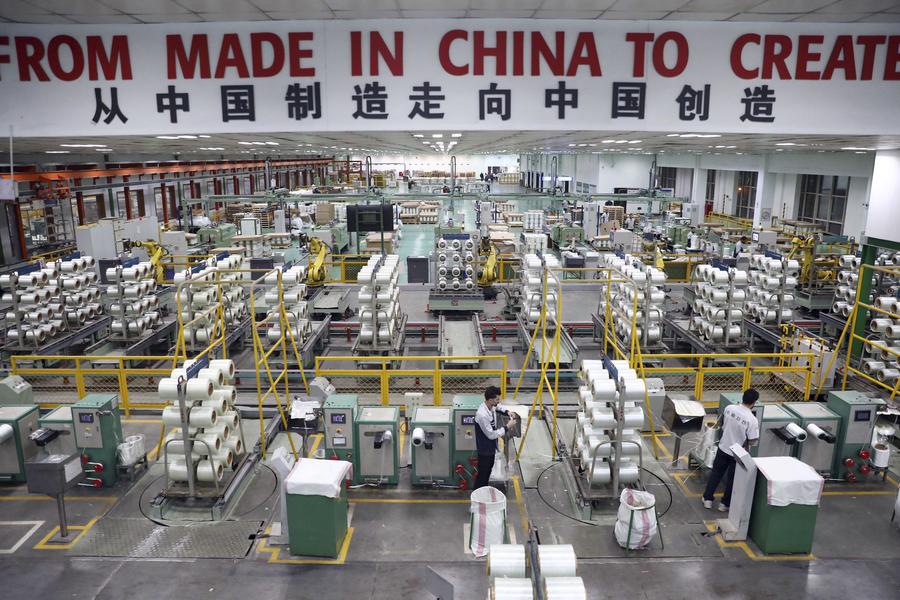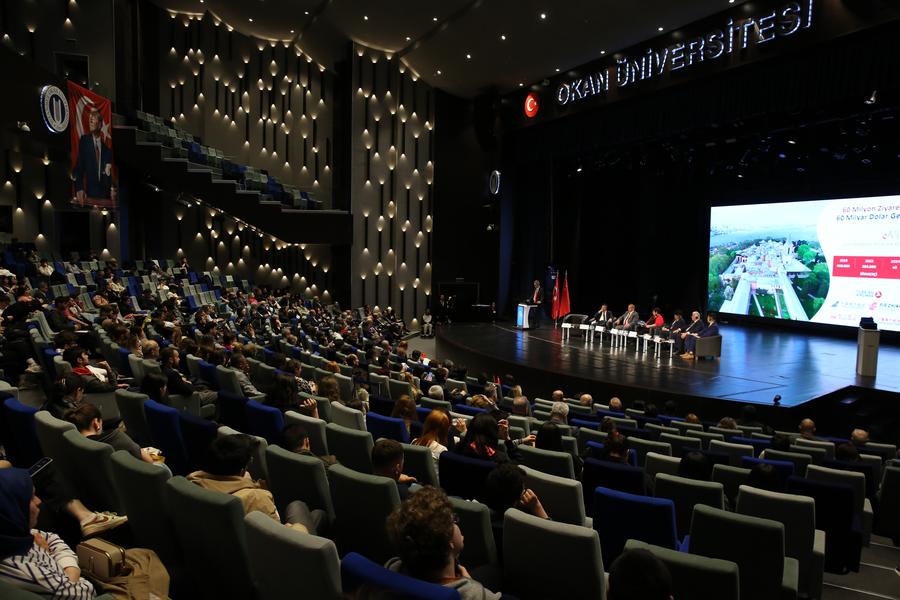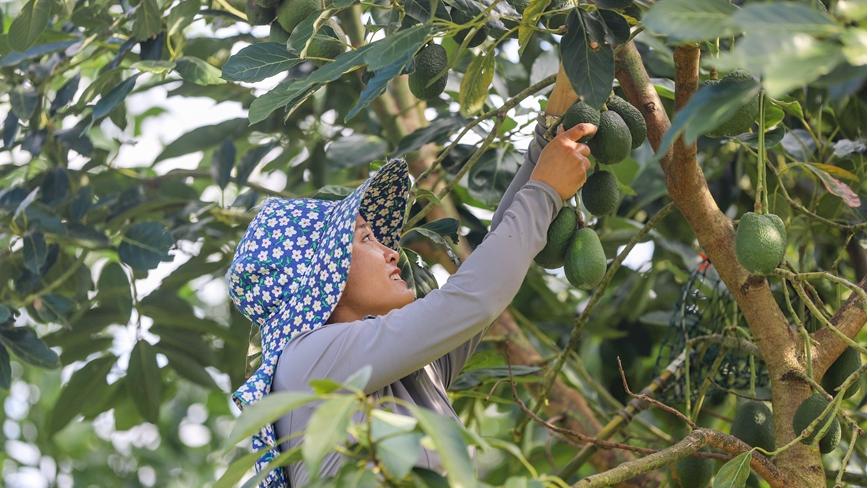Yearender: Mideast economies hit by regional conflicts in 2024 as cooperation with China gains momentum
ISTANBUL, Dec. 24 (Xinhua) -- Amid the chaos of escalating conflicts in the Middle East in 2024, a complex economic landscape has emerged: While the warring nations grapple with crippling economic setbacks, oil-producing nations in the Gulf sustain steady growth, driven by rising oil prices and strategic economic transformation.
Most countries in the Middle East now recognize the importance of pursuing economic diversification and common development with the broader group of developing countries. In this process, deepening cooperation with China has emerged as a broad regional consensus. This year, cooperation between China and Middle Eastern countries has continued to progress steadily.
HEAVY ECONOMIC TOLL ON WARRING NATIONS
The conflicts in the Middle East have inflicted heavy human casualties and a significant economic toll on those countries directly involved.
The Palestinian territories are nearing economic collapse, with their largest economic contraction on record. Gaza's economy shrank by 86 percent in the first half of 2024, while the West Bank saw a 23-percent decline in economic activity over the same period amid challenges including a deep fiscal crisis, strained labor market, income disparity, and weakened demand, according to a World Bank Economic Monitoring Report published in December under the title of "Impacts of the Conflict in the Middle East on the Palestinian Economy."
The political upheaval in Syria is expected to have far-reaching consequences, further exacerbating the country's already deteriorating economy. Though the Syrian interim government has announced its determination to initiate economic reforms, the broader economic outlook remains uncertain.

Vendors display their goods for sale along a street in Damascus, Syria, Dec. 16, 2024. (Photo by Ammar Safarjalani/Xinhua)
In Lebanon, long-term Israeli attacks, despite a recent ceasefire, have destroyed infrastructure, weakened public services, and hindered economic progress in the country.
Fighting simultaneously on multiple fronts, Israel has also faced significant economic repercussions. Israel's central bank revised downward its growth forecast for 2024 to 0.5 percent, as the country is grappling with substantial economic challenges, including a hard-hit business sector, a decline in foreign investments, and a reduced appetite for capital from international investors.
Meanwhile, neighboring Jordan has been affected by declines in tourism receipts, according to another World Bank report published in mid-October.
Ramona Mubarak, head of Risk Management for the Middle East and North Africa (MENA) at Fitch Solutions, said that the Suez Canal, a major source of foreign currency for Egypt, used to generate around 750 million U.S. dollars per month, but its revenues significantly decreased this year, averaging 300 million dollars per month.
Türkiye, sharing a long border with Syria, faces significant economic challenges as well, including inflation and sharp currency depreciation. Additionally, the country is under pressure from hosting millions of refugees, deteriorating trade relations with Israel -- its key regional trading partner -- and managing the broader fallout from ongoing regional conflicts.
In October, the International Monetary Fund (IMF) predicted that Middle Eastern economies could face extended recovery periods, with per capita GDP declining by 10 percent even 10 years after the conflict.

People attend the Gulf Information Technology Exhibition (GITEX) in Dubai, the United Arab Emirates, on Oct. 17, 2024. (Xinhua/Duan Minfu)
ECONOMIC STABILITY FOR PEACEFUL COUNTRIES
Amid recurring armed conflicts, some countries have managed to maintain economic stability and growth through strategic diversification and reforms.
The mid-October World Bank report forecasted modest growth for the MENA region, with the GDP growth rate rising from 1.8 percent in 2023 to 2.2 percent in 2024. This increase is driven by Gulf Cooperation Council (GCC) countries, where growth is projected to rise from 0.5 percent in 2023 to 1.9 percent in 2024.
Oil and gas revenues remain crucial for GCC countries, with Saudi Arabia, the United Arab Emirates (UAE), Kuwait, and Qatar continuing to capitalize on their vast energy reserves.
In addition, these countries seek to unlock more promising sectors in addition to traditional pillar industries.
The UAE has invested heavily in sectors such as tourism, real estate, finance, and technology.
Meanwhile, Saudi Arabia's Vision 2030 initiative focuses on transforming the country's economy by expanding non-oil sectors like entertainment, tourism, and non-oil exports, opening new avenues for foreign investment.
The regional geopolitical conflicts have had an indirect yet limited impact on the GCC countries, IMF Director for the Middle East and Central Asia Jihad Azour said in an interview in late October.
Among GCC economies, non-oil sector growth is projected to reach 3.7 and 4 percent for 2024 and 2025, respectively, partly supported by ongoing economic diversification efforts, he said.
In the meantime, Egypt, also not directly engaged in conflicts, is showing signs of recovery despite facing significant challenges, such as high inflation. A report published by the Organization for Economic Cooperation and Development on Dec. 4 forecasted Egypt's economic growth to reach 3.7 percent in the current fiscal year 2024/2025, driven by receding inflationary pressures, recovering domestic demand, emerging investment projects, and growing gas and oil exports. Growth is expected to strengthen further in the next two fiscal years, with forecasts of 5.0 and 5.2 percent, respectively.
Türkiye, mired in economic woes rather than conflicts, has implemented a series of monetary and fiscal policies, including interest rate adjustments, and other efforts to stabilize local currency and tame high inflation. The annual inflation rate eased to 47.09 percent in November, marking its lowest point since June 2023. Additionally, the Turkish government has implemented measures to control rising food and energy prices while focusing on boosting domestic production and reducing import dependency to alleviate inflationary pressures.

Staff members work on the fiberglass production line at a factory of Chinese fiberglass giant Jushi at the China-Egypt TEDA Suez Economic and Trade Cooperation Zone in Ain Sokhna district of Suez province, Egypt, Nov. 6, 2024. (Xinhua/Ahmed Gomaa)
BETTER ECONOMIC DEVELOPMENT VIA COOPERATION WITH CHINA
Over the past year, cooperation with China has brought vitality and momentum to many Middle Eastern economies.
In an interview with Xinhua in September, Saudi Arabia's Minister of Investment Khalid Al-Falih said trade between China and Saudi Arabia continues to grow rapidly, with trade volume surpassing 100 billion dollars in 2023. This upward trend has extended into the first half of 2024, he added.
Around 750 Chinese joint ventures or companies currently operate in Saudi Arabia, contributing to major construction projects, including the Neom megaproject, according to Al-Falih.
"China is leading the whole world in the green industry and renewable energy. There are a lot of technologies -- cars, batteries, and robotics -- that the world is trying to follow," Saudi Finance Minister Mohammed Al-Jadaan told Xinhua in an exclusive interview at the 8th Future Investment Initiative conference held in Riyadh in October.
In 2024, China has intensified its cooperation with Egypt, particularly in the manufacturing sector. By setting up factories in Egypt, Chinese companies are creating jobs and helping fill the country's manufacturing capacity gap.
In Iraq, many Chinese companies have partnered with local firms in oil and gas exploration over the past year, lowering the cost of oil and gas development in the country and facilitating the iterative upgrading of the local energy industry.
In late April, a deal for the world's largest single shipbuilding order was signed between China State Shipbuilding Corporation and QatarEnergy. The Chinese shipbuilding firm will construct 18 ultra-large liquefied natural gas transport ships, each with a payload capacity of 271,000 cubic meters, for Qatar.

People attend the 6th Türkiye-China Economic Forum in Istanbul, Türkiye, on April 18, 2024. The 6th Türkiye-China Economic Forum opened here on Thursday (April 18) with representatives exploring ways to promote bilateral trade ties and expand cooperation in more fields. (Photo by Safar Rajabov/Xinhua)
Trade between China and Türkiye has been steadily growing, with China becoming one of Türkiye's largest trading partners. While China's exports to Türkiye mainly include machinery, electrical equipment, and high-tech products, Türkiye's exports to China mainly include agricultural products, textiles, and minerals, among others.
Both countries have worked to promote tourism and cultural exchanges, with China becoming an increasingly important source of tourists to Türkiye.
Diaa Helmy, secretary-general of the Egyptian-Chinese Chamber of Commerce, said China has been cooperating with the Middle East, with initiatives aimed at promoting joint interests, fostering growth, and maintaining peace.
China, which has developed unique and trusted relationships with regional countries, has been pursuing policies to help the Middle East become more stable and secure, he said.
Photos
 Menglian in SW China's Yunnan produces over 80 percent of country's avocados
Menglian in SW China's Yunnan produces over 80 percent of country's avocados 37th Sun Island Int'l Snow Sculpture Expo begins trial operation in China's Harbin
37th Sun Island Int'l Snow Sculpture Expo begins trial operation in China's Harbin Explore an immersive cultural and creative products market at the Xinjiang Library
Explore an immersive cultural and creative products market at the Xinjiang Library Yuyuan Garden Lantern Fair to light up Shanghai on New Year's Day
Yuyuan Garden Lantern Fair to light up Shanghai on New Year's Day
Related Stories
- Chinese FM elaborates on China's stance on turmoil in Middle East
- China urges ceasefire amid rising Middle East tensions
- Ceasefire and cessation of hostilities in Middle East urgent: FM spokesperson
- China to play constructive role in cooling down Mideast conflict -- FM
- Med9 leaders urge ceasefire, diplomatic efforts in Middle East
Copyright © 2024 People's Daily Online. All Rights Reserved.





